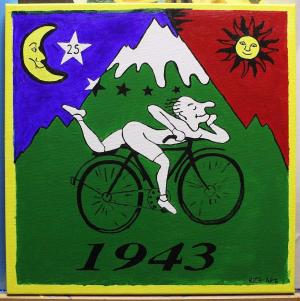This article was produced in collaboration with AlterNet and first appeared here.
This year's United Nations General Assembly Special Session (UNGASS) on Drugs is notable for the increasing inclusion of non-governmental voices, with civil society being represented for the first time within the session itself. In this case, civil society refers to non-governmental organizations, most of which seem to oppose the existing international drug prohibition regime.

On Monday, the Latin American Caravan for Peace, Life and Justice, Students for Sensible Drug Policy (SSDP), and Moms United -- a group in which many members have lost children to prison, violence, or drug overdoses -- rallied hundreds of people to call for repealing global drug prohibition. On Wednesday, April 20, the cannabis culture contingent was out in force to call for marijuana legalization.
But the demonstration on Tuesday, April 19, was to promote a slightly more esoteric position: support for access to psychedelic drugs. The date is known by psychonauts as Bicycle Day, to commemorate April 19, 1943, the date Swiss chemist Albert Hofmann intentionally ingested his new creation, LSD-25, took off for home on his bicycle, and began tripping brains, inaugurating the modern psychedelic era.
The ride was a bit bumpy, with Hofmann reporting wavering vision, a sense of motionless, and a "weird, unfamiliar world." But it got better, as he wrote in his notes on the hallucinogenic trip:
Now, little by little I could begin to enjoy the unprecedented colors and plays of shapes that persisted behind my closed eyes. Kaleidoscopic, fantastic images surged in on me, alternating, variegated, opening and then closing themselves in circles and spirals, exploding in colored fountains, rearranging and hybridizing themselves in constant flux.
Welcome to the psychedelic age. Between then and the late 1960s, LSD was the subject of much fascinating and provocative research, especially on its therapeutic uses for dealing with issues such as alcoholism, trauma, and depression. But that scientific interest was squelched by the prohibition of the drug (and its insertion into Schedule I of the Controlled Substances Act in the US) after its use spread from scientific and research circles into the population at large, especially the hippies.
Still, interest in LSD and other psychedelics never went away, and now the mind-altering substances are making a comeback, both in the research community and in popular culture. Earlier this month, scientists examined the brains of people on acid using cutting-edge nuero-imaging techniques to show exactly what LSD does in the human brain. And further research on LSD and other psychedelics for therapeutic purposes is ongoing.
But the people in the plaza on Tuesday were, for the most part, not scientists and researchers but enthusiasts and psychedelic explorers. Led by Psymposia and the Psychedelic Society of Brooklyn (one of at least 50 city-based such societies around the world), they took on the question of why use, support, or call for the legalization of the consciousness-changing drugs by providing their own answers under the format of "Psychedelics Because…"
"The science has been there for 50 years, but that doesn't change hearts and minds," began event MC Lex Pelger as he urged a popular push for psychedelic acceptance. "When used properly and with intention, these drugs can be tremendously beneficial," he added, citing the recent (and not so recent) research on their therapeutic potential.
Pelger urged others in the audience to share their own stories, and they did.
"I was seriously depressed and then did iboga and cured myself," said someone identifying himself as Rainbow Star Guide. "Eat the plants!"
Another speaker, also citing problems with depression, said that he used ayahuasca to break free.
"It gave me a feeling of happiness, energy, and contentment," he said. "Think about the influence that psychedelic culture could have. These substances can open us up to try to build a better world, to save the world."
"The war on drugs is stealing happiness from the world!" interjected Pelger.
"Psychedelics can help shake you free of your shit," said another speaker, who identified as a shamanic practitioner who worked with ayahuasca, before playing a trippy ode to the powerful herbal concoction on a very strange drum-like instrument.
A young man who identified himself as a Muslim described his confusion and alienation growing up in the faith in America in the post-9/11 era. He told how he ate magic mushrooms at age 16 in a search for spiritual direction.
"That offered me the resilience and the head space to develop my own framework," he said.
Not everyone claimed profound, life-changing reasons for using psychedelics.
"Psychedelics because they make the music sound great and because my head doesn't belong to the state," said a long-haired man who appeared old enough to have melted his mind listening to Jimi Hendrix.
Some psychedelic researchers were present, including Neil Goldsmith, a psychotherapist and author of Psychedelic Healing: Entheogens for Psychotherapy and Spiritual Development.
"Psychedelics enhanced my practice by illuminating my insides," he said. "I do them and bring that insight and wisdom to my practice. Psychedelics should be permitted as an adjunct to psychotherapy," Goldsmith added.
Psychedelic science, medicine, and culture is undergoing a renaissance. It's breaking out all over, including this week in the shadows of UN headquarters. The nations of the world may not be listening yet, but the clamor is growing louder.
This work by StoptheDrugWar.org is licensed under Creative Commons Attribution-ShareAlike 4.0 International
Comments
Thanks to everyone who showed up at the dumbo UN
to rally for psychedelic freedom. Well done.
helped heal my PTSD
Thanks for your efforts, all
Add new comment